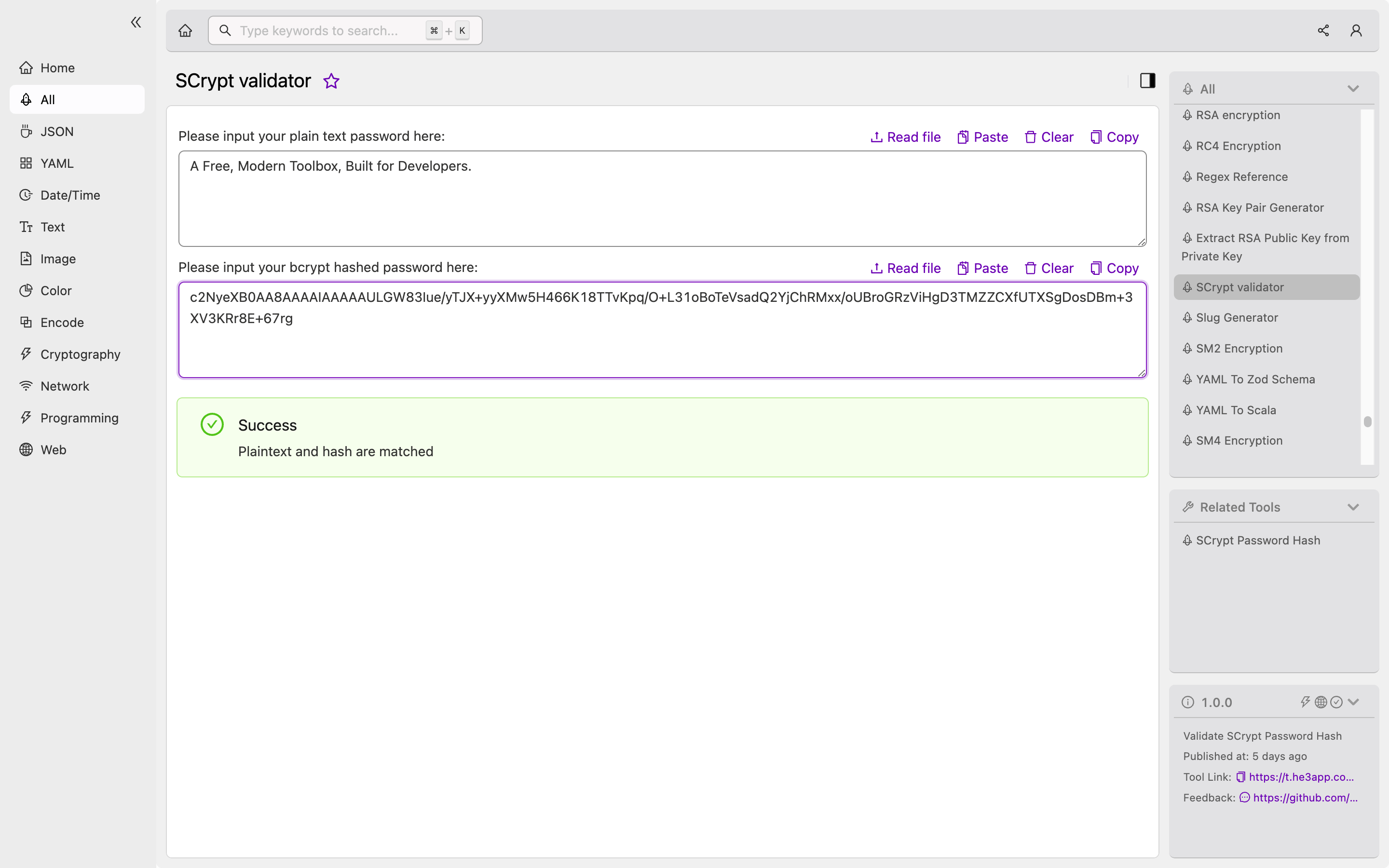Understanding SCrypt Validator: A Comprehensive Guide for Developers
As a developer, you must have come across the term SCrypt validator in your work on security and cryptography. SCrypt validator is a hashing function that has been developed as an alternative to the widely used bcrypt. In this article, we will take a look at how the SCrypt validator works, dive into its unique features, and bust some common misconceptions about this technology.
What is SCrypt Validator?
SCrypt validator is a key-stretching algorithm that derives a cryptographic key from a password. Like other password-based key derivation functions (PBKDFs), SCrypt validator is designed to make brute-force attacks against hashed passwords computationally infeasible. In essence, SCrypt validator creates a unique and sparsely populated memory array that can only be validated by replica processing. The algorithm is designed to require a significant amount of memory to compute, making it much more difficult for attackers to perform exhaustive search attacks.
How Does SCrypt Validator Work?
SCrypt validator works by taking a password and running it through a function that generates a hash. The hash is then used to derive a key, which is used to encrypt or decrypt data. Unlike other password-based key derivation functions, SCrypt validator uses a large amount of memory to make it computationally infeasible for attackers to perform exhaustive search attacks. The algorithm can be parameterized with various memory and CPU requirements, making it more difficult to crack.
One of the main benefits of using SCrypt validator over other password-based key derivation functions is that it can resist attacks from custom hardware, including GPUs (graphics processing units) and ASICs (application-specific integrated circuits). These hardware types are tailored to perform repetitive tasks, making them ideal for brute-force attacks against passwords. However, SCrypt validator is designed to require a large amount of memory to compute, making it less efficient for these types of attacks.
Sample code:
import os, binascii
import scrypt
password = b'thisismypassword'
salt = os.urandom(16)
key = scrypt.hash(password, salt, N=2**14, r=8, p=1, dkLen=32, encoding='hex')Key Features of SCrypt Validator
Here are some of the key features and benefits of using SCrypt validator:
| Feature | Description |
|---|---|
| Memory-Hard Function | The algorithm is designed to require a significant amount of memory to compute, making it more difficult for attackers to perform exhaustive search attacks. |
| Fine-Tuning Parameters | Developers can fine-tune the parameters of the algorithm to make it more or less memory-intensive, depending on the needs of their application. |
| Resistance to Custom Hardware Attacks | Unlike other password-based key derivation functions, SCrypt validator is resistant to attacks from custom hardware, such as GPUs and ASICs, thanks to its memory-intensive nature. |
| Easy Integration with Applications | SCrypt validator is designed to be easy to integrate with applications, making it a popular choice for developers who need a fast and efficient way to secure their sensitive data. |
| Open-Source and Widely Available | SCrypt validator is open-source and widely available, making it a popular choice for developers who need a fast and efficient way to secure their sensitive data. |
SCrypt Validator Use Cases
SCrypt validator is a popular choice for developers who need a fast and efficient way to secure their sensitive data. Here are some of the most common use cases for SCrypt validator:
- Password Storage: SCrypt validator is commonly used to securely store password hashes in databases or other data stores.
- File Encryption: SCrypt validator can be used to encrypt files so that only authorized users can access them.
- Secure Communications: SCrypt validator can be used to securely communicate and exchange data between two parties.
Misconceptions About SCrypt Validator
Here are some common misconceptions about SCrypt validator:
- SCrypt validator is only useful for password hashing: While SCrypt validator is commonly used to securely store password hashes, it can also be used to encrypt files and secure communications.
- SCrypt validator is slower than other password-based key derivation functions: While SCrypt validator is more memory-intensive than other password-based key derivation functions, it can actually be faster in some cases, especially when parameters are set correctly.
Frequently Asked Questions
Q1: How does SCrypt validator compare to other password-based key derivation functions?
A: SCrypt validator is generally considered to be more memory-intensive than other password-based key derivation functions, making it more resistant to brute-force attacks using custom hardware. It is also more configurable than many other PBKDFs, allowing developers to fine-tune its parameters to meet the specific needs of their application.
Q2: Is SCrypt validator secure enough for my application?
A: SCrypt validator is a widely-used, open-source PBKDF that is considered secure by many experts. However, like any encryption technology, its security depends on proper implementation and configuration within your application. It is important to consult with security experts to ensure that you are using SCrypt validator in a way that provides the appropriate level of security for your application.
Q3: How can I easily use SCrypt validator in my project?
A: You can use SCrypt validator tool in He3 Toolbox (https://t.he3app.com?zru6 ) easily.

Conclusion
In conclusion, SCrypt validator is a powerful and flexible hashing algorithm that can help you secure your sensitive data. Its memory-intensive nature and fine-tuneable parameters make it a popular choice for developers who need to secure passwords, files, and communications. If you’re looking for a fast and efficient way to secure your sensitive data, be sure to consider SCrypt validator as part of your security toolkit.
